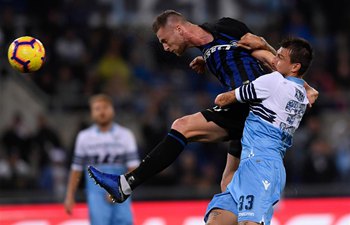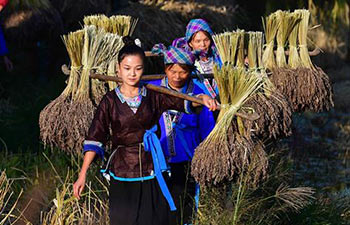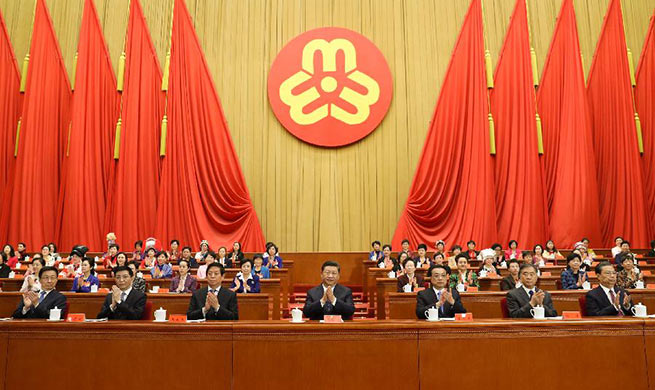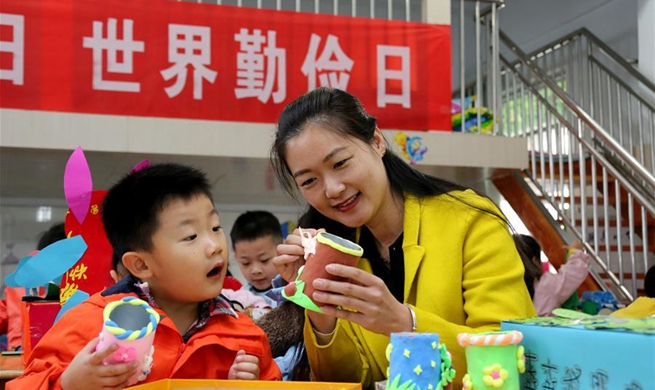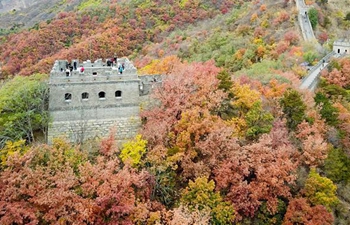BEIJING, Oct. 31 (Xinhua) -- Readers across China continue to pay tribute to celebrated author Louis Cha Leung-yung, remembering him as a guru of martial arts novels and a source of inspiration in their adolescence and beyond.
Cha, more widely known by his pen name Jin Yong, died at 94 at a hospital in Hong Kong on Tuesday. He is universally regarded as the most influential wuxia (martial arts and chivalry) novelist in the 20th century.
He published 15 novels from 1955 to 1972 and sold hundreds of millions of copies worldwide. His stories have also inspired various cultural and creative products including movies and TV series.
For many Chinese fans, reading Cha's novels under flashlights during sleepless nights or swarming in front of a small TV set for a new episode in the 1980s and 90s are collective memories from their adolescence.
"Jin Yong's novels were a companion throughout my younger days," said Guo Yuanjing, a graduate student at Tianjin University, who fondly recalled that her mother would reward her with a Cha novel whenever she ranked the first in an exam.
"It is often said martial arts novels are fairy tales for adults," said Guo. "Jin Yong has created a utopian world of martial arts for us ordinary people who long for the spirit of chivalry."
Zhu Xiaoshan, an office worker in Beijing, said his first encounter with Cha's martial arts world was through an adapted TV series when he was 7 years old.
"It was a household event in my hometown when the TV series was aired," 38-year-old Zhu said. "Not every family had a TV set but nearly everybody had watched it."
"In his novels, Cha has created a lot of memorable characters, many of whom have even become our models for seeking spouses," said Zhu, who finished reading all of Cha's novels during college.
On the social media platform WeChat, a netizen said Cha's novels and their television adaptations fascinated so many readers because of a "chivalrous tenderness" and a strong sense of justice and caring for the weak.
"Inside the heart of every boy, there is always a dream of becoming a martial arts master," said the same netizen. "Through his novels, Jin Yong has conveyed to the readers his values and views toward life and love."
For many kung fu practitioners, certain characters in Cha's novels were a constant model for both martial arts expertise and moral integrity.
"There is a commonality for many main characters in Cha's novels: They believe the essence of chivalry is for the country and the people," said Guo Yuancheng, who has taught kung fu in New Zealand for more than two decades. "Every kung fu practitioner can find their hero in Cha's novels."
In addition to the popularity of Cha's novels among readers, many critics have also spoken highly of their artistic value and status in the history of Chinese literature.
Li Chun, an art professor at the Communication University of China, said the martial arts world Cha created offered readers a kind of "spiritual retreat" during the 1980s and 90s when his novels entered the mainland market.
"In some sense, Jin Yong's works filled the spiritual vacuum of many readers who had longed for a new value system after living through a time of turbulence," said Li.
Zhou You, a lecturer at Tianjin University, said the mesmerizing plots of Cha's novels have sometimes overshadowed the literary value of his works.
"Every Cha novel touches on a different theme," Zhou said. "It is a pity that the thematic significance of Cha's work is not yet fully recognized by the literary circle."







